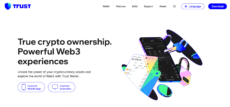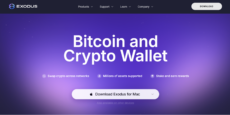Solana has rapidly become a cornerstone of the Layer 1 blockchain landscape, known for its speed, low fees, and robust developer a...
Best Anonymous Crypto Wallets 2025: Crypto Wallets Without KYC
| Updatedby Tony Frank · 22 mins read

This guide ranks and reviews the best anonymous crypto wallets for 2025. Read on to learn best practices for safe crypto storage.
Disclaimer: Cryptocurrencies are considered high-risk investments. This article serves for informational purposes only. It should not be perceived as financial advice. By reading our website, you acknowledge and accept our terms and conditions. Our content may include affiliate links, through which we may earn a commission.
Non-custodial wallets offer an anonymous experience, with no personal or contact details collected. Users can send, receive, and often trade cryptocurrencies without KYC procedures, ensuring complete privacy.
Other wallet features should also be considered, including supported networks, security measures, and user-friendliness. This guide ranks and reviews the best anonymous crypto wallets for 2025. Read on to learn best practices for safe crypto storage without revealing your identity.
Key Takeaways on Anonymous Crypto Wallets
- Anonymous crypto wallets must be “non-custodial,” meaning the user controls the private keys, eliminating third-party reliance (like an online exchange).
- Transactions are sent and received on a wallet-to-wallet basis, so they’re tied to public addresses rather than identities.
- Avoid hardware wallets for complete privacy — a name and an address are needed when purchasing.
- While many anonymous wallets offer fiat gateways, allowing users to buy cryptocurrencies with real money, this can trigger KYC procedures.
- Anonymity is just one aspect when choosing a wallet — consider safety, reputation, available networks, and the user experience.
8 Most Anonymous Bitcoin Wallets to Use in 2025
Let’s start by ranking the best anonymous crypto wallets for 2025:
- Best Wallet – The Overall Best Anonymous Wallet for Crypto Investors
- Trust Wallet – Anonymously Store Millions of Cryptocurrencies From 100+ Networks
- Electrum – Trusted and Secure Bitcoin Wallet Software for Windows and Mac Users
- MetaMask – Best Option for Active Traders Using Ethereum-Based dApps
- Exodus – Multi-Device Crypto Wallets for Desktops, Browsers, and Mobiles
- Coinbase Wallet – Decentralized Wallet App Aimed at First-Time Crypto Investors
- Phantom – Top Choice for Storing and Trading Solana Ecosystem Meme Coins
- Atomic Wallet – Securely Store and Swap Tokens Anonymously and Earn Cashback
Reviewing the Best Crypto Wallets Without KYC
Anonymous crypto wallets ensure privacy, but this is only one factor to consider. Security, supported cryptocurrencies, trading features, and device types are also important.
Let’s take a closer look at reputable crypto wallets that don’t require ID.
1. Best Wallet – Our Top Crypto Wallet Pick for Privacy and Anonymity
Best Wallet is a non-custodial wallet app offering anonymity from the get-go. No personal information, IP addresses, or ID documents are collected — ensuring complete privacy. Anonymity extends to trading services, too, with Best Wallet offering a native decentralized exchange (DEX). Users can swap millions of cryptocurrencies from over 60 network standards.
Swaps are conducted by reputable liquidity pools, meaning users get the best price possible without revealing their identities. Best Wallet users can purchase cryptocurrencies with fiat money too — again without KYC processes.

Best Wallet is compatible with the most popular cryptocurrencies, including Bitcoin, Ethereum, XRP, Litecoin, Solana, and BNB. No fees are required to receive and store digital assets, while outgoing transfers mirror the network charge.
Best Wallet also stands out for its security-first framework — it encrypts and stores private keys on the user’s device. Biometrics and two-factor authentication are also provided. Best Wallet’s drawback is that no desktop software is offered, although a browser extension is in development.
Pros
- The overall best anonymous crypto wallet for privacy-centric investors
- Supports millions of tokens from 60+ networks
- Buy, sell, and trade cryptocurrencies without KYC
- Built-in staking feature with competitive APYs
- Highly rated by crypto beginners
Cons
- Currently, it is only available as a mobile app
- Some roadmap features are still in development
2. Trust Wallet – Safely and Privately Store Crypto Tokens From 100+ Networks
Trust Wallet is a non-custodial wallet supporting over 100 networks. It’s a great choice for storing cryptocurrencies with different token standards, like Ethereum (ERC20), Solana (SPL), and BNB Chain (BEP20). Custom tokens are added via contract addresses, so even brand-new cryptocurrencies can be stored effortlessly.
Trust Wallet does not require KYC when sending, receiving, or storing cryptocurrencies. However, using fiat facilities requires ID. The workaround is connecting Trust Wallet to a decentralized application (dApp) like Uniswap or SushiSwap. Trust Wallet immediately credits purchased dApp tokens without revealing identities.

Trust Wallet is available as a mobile app for iOS and Android. Desktop extensions for Chrome and other popular browsers are supported too. The wallet has a great reputation — over 200 million users have downloaded Trust Wallet since launching in 2017. It’s also renowned for its user-friendly experience and biometric security.
Pros
- Compatible with over 100 network standards
- Available as a mobile app and browser extension
- Biometric security when logging in
- Used by over 200 million people
- A great option for frequent dApps users
Cons
- KYC is required when buying crypto with fiat money
- Lower staking rewards than other anonymous wallets
3. Electrum – Highly Rated Bitcoin Desktop Software Launching in 2011
Electrum is a desktop wallet launching in 2011 — designed exclusively for Bitcoin. Native software is available for Windows and Mac users, and no personal information is needed when downloading. Electrum encrypts the user’s private keys and they’re securely stored on the desktop device. Users also receive a 12-word passphrase, ensuring wallet recovery if needed.
The no KYC Bitcoin wallet offers robust security features, including multisig verification. This requires authorization from two or more devices when transferring funds. Electrum is also an open-source wallet, with its MIT license publicly published. The developer community can scrutinize Electrum’s code for potential vulnerabilities, which is an added safeguard.

Electrum is free to use, but several drawbacks should be considered. It won’t be suitable for storing altcoins like Ethereum and Solana, nor does it connect with dApps. A mobile app for Android is available, although iOS isn’t supported. In our view, Electrum is best for long-term Bitcoin investors who simply want a safe place to store their wealth.
Pros
- The best anonymous Bitcoin wallet for desktop users
- Free software for Windows and Mac users
- Complete anonymity and robust security features
- The underlying wallet code is open-source
Cons
- Altcoins can’t be stored
- The basic interface won’t appeal to modern investors
4. MetaMask – Seamlessly Connect With Ethereum and EVM-Compatible dApps
MetaMask is a reputable wallet provider offering a private investing experience. It’s one of the best anonymous crypto wallets for accessing Ethereum-based dApps. It easily connects with DEXs like Uniswap and DeFi platforms like Aave, Compound, and Curve. MetaMask is compatible with other EVM-compatible ecosystems, including BNB Chain, Base, Blast, and Polygon.
MetaMask supports custom tokens from all supported networks, translating to millions of digital assets. However, MetaMask isn’t compatible with Bitcoin, XRP, Litecoin, Solana, and other non-EVM blockchains — a drawback for many users.

MetaMask features include pooled staking via Rocket Pool and Lido. The wallet can also be used for validator staking, which requires 32 ETH or more. Users can also trade cryptocurrencies directly from their MetaMask balance. The charge on token swaps is 0.85% plus the liquidity pool’s fee. This is higher than many wallet providers.
Pros
- Popular no KYC crypto wallet for Ethereum users
- Effortlessly engage with Ethereum-based dApps
- Also supports BNB Chain and other EVM-compatible standards
- Built-in staking for ETH and POL
- The user-friendly interface appeals to beginners
Cons
- Lacks support for Bitcoin and other top cryptocurrencies
- 0.85% surcharge on token swaps
5. Exodus – No KYC Crypto Wallet Software for Desktop and Mobile Users
Exodus was launched in 2015 and offers native wallet software for most device types. Desktop users can choose between Windows, Mac, or Linux software or browser extensions for Chrome and Brave. Exodus also offers mobile apps for iOS and Android. Each downloaded wallet is separate, meaning it comes with unique private keys.
Exodus doesn’t collect IP addresses or personal information, providing privacy and anonymity. It’s compatible with over 50 blockchains, including Bitcoin, XRP, Dogecoin, Litecoin, Ethereum, and Solana. Users can add custom digital assets like ERC20 and SPL tokens through their smart contract address.

The untraceable Bitcoin wallet offers many side features, including real-time portfolio management tools. Users can choose their preferred currency for real-time prices, such as USD or AUD. Features also extend to token swaps and fiat purchases. The latter allows users to buy and sell cryptocurrencies with bank transfers, credit cards, and e-wallets.
Pros
- Free crypto wallet software for desktops, browsers, and mobiles
- 50+ blockchains are supported, including Bitcoin
- Users can swap millions of tokens directly from the wallet interface
- Portfolio management features with real-time prices
- Compatible with hardware wallets like Trezor
Cons
- Fiat purchases can trigger KYC
- Doesn’t offer a browser extension for Firefox
6. Coinbase Wallet – Beginner-Friendly Wallet App for iOS and Android Devices
Coinbase Wallet is a decentralized wallet app for iOS and Android. It’s separate from the Coinbase exchange, so users aren’t asked for personal information or KYC documents. Users receive a backup passphrase and encrypted private keys when starting, and the app is protected by PIN or biometrics.
Coinbase Wallet supports Bitcoin, Ethereum, and several EVM-compatible networks – including BNB Chain, Base, Polygon, and Arbitrum. The wallet also supports Dogecoin and Solana, including millions of SPL meme coins. It’s also compatible with NFTs, allowing users to store, view, and even listen to their digital artworks.

The user experience is beginner-friendly, just like the Coinbase exchange. Users can easily connect with dApps directly from the app interface. Platforms like Uniswap, ENS, Zora, OpenSea, and Trader Joe come pre-integrated for additional convenience. Coinbase Wallet also supports WalletConnect so that users can access dApps from a desktop device.
Pros
- Offers an anonymous cryptocurrency wallet for iOS and Android
- Completely separate from the KYC-driven Coinbase exchange
- Comes integrated with popular dApps like OpenSea and Trader Joe
- Security features include biometrics and encrypted private keys
Cons
- Transferring funds from Coinbase means anonymity is lost
- Doesn’t support Bitcoin Cash or Ethereum Classic
7. Phantom – Buy, Sell, and Trade Solana Meme Coins Directly From the Wallet Balance
Phantom is an untraceable crypto wallet designed for the Solana ecosystem. It’s used by over 15 million people, and all SPL tokens are supported. Phantom is a popular choice for trading meme coins on Raydium, Orca, Jupiter, and Meteora. It’s directly integrated with these DEXs, so wallet balances can be used to buy and sell digital assets effortlessly.
Phantom ensures complete privacy for its users — no IP addresses or personal data are collected. Safety features are also highly rated, including a warning system for suspicious actions. Users receive a real-time warning before connecting with an unknown dApp. Warning signs are also attached to tokens that have been sent to the wallet balance.

Phantom recently extended support for other network standards, including Bitcoin, Base, Ethereum, Sui, and Polygon. Users can add custom tokens to these networks via contract addresses. However, we recommend avoiding Phantom’s in-app analytics—market prices and portfolio valuations are often incorrect.
Pros
- One of the best anonymous crypto wallets for Solana traders
- Integrates with leading DEXs like Raydium and Orca
- Network support extends to Bitcoin, Sui, Ethereum, Base, and Polygon
- Completely free and private
Cons
- No desktop software for Windows, Mac, or Linux
- Doesn’t support XRP or Litecoin
8. Atomic Wallet – Established Wallet App and Software With Over 10 Million Users
Atomic Wallet is an established wallet provider launched in 2018. It’s compatible with mobile and desktop devices, and its operating systems include Windows, Mac, iOS, and Android. The wallet also offers a browser extension for Chrome. All versions are decentralized, anonymous, and free to install.
Atomic Wallet comes pre-integrated with 1,200+ cryptocurrencies, including real-time prices. Digital assets include Bitcoin, Litecoin, XRP, Dash, Stellar, Ethereum, Solana, and Sui. Users can also add custom tokens, but prices aren’t imported.

Users like Atomic Wallet’s feature-rich interface, which includes staking rewards. TRON, BNB, and Solana yield 5%, 2.5%, and 7%, respectively — APYs are subject to change. The wallet also offers anonymous token swaps for 60+ cryptocurrencies. This includes cross-chain functionality, such as swapping XRP for Litecoin. Users can also instantly buy cryptocurrencies with Visa and MasterCard, which requires KYC documents.
Pros
- Popular desktop and mobile wallet with 10 million users
- Real-time prices for 1,200+ cryptocurrencies
- Supports Bitcoin, XRP, Dogecoin, and dozens of other networks
- Offers cross-chain token swaps without ID
Cons
- Custom tokens don’t import market valuations
- Fiat purchases can’t be made anonymously
How do Anonymous Crypto Wallets Protect Your ID?
The best anonymous crypto wallets offer complete privacy. Read on to learn how they protect your identity and what steps to take to ensure anonymity isn’t lost.
No Personal Information or IP Addresses are Collected
Anonymous wallets don’t collect personal information when downloading their software, whether that’s on a mobile or desktop device. This is because you’re using a non-custodial wallet, ensuring complete private key control.
Custodial wallets, such as those offered by online exchanges, usually have KYC processes, so anonymity isn’t an option.
IP addresses aren’t collected either when using an anonymous wallet. That said, some users activate a VPN before downloading, adding an extra layer of privacy.
Transactions are Linked to Wallet Addresses
Anonymous crypto wallets allow users to send and receive funds without revealing their identities. Transactions are linked to wallet addresses, a unique combination of numbers and letters that do not reference the user’s name.
An example is sending ETH to an Ethereum wallet address, which could look like this:
- 0x1D1479C185d32EB90533a08b36B3CFa5F84A0E6B
Receiving cryptocurrencies into an anonymous wallet works similarly but in reverse. When the wallet is set up, unique addresses are generated covering all compatible networks.
When Anonymity is Lost
Anonymity is never guaranteed, as certain wallet functions could leave a trace.
One example is transferring cryptocurrencies from an exchange account that has undergone KYC procedures. The exchange knows the anonymous wallet belongs to you, considering you’ve already provided a name and government-issued ID. Future transfers can then be tracked, as the blockchain records all transactions on the public ledger.

Anonymity can also be lost when using fiat services, such as buying Bitcoin with a credit card directly in the wallet. These transactions are processed by third-party gateways, which may request ID documents. One solution is to use Best Wallet, which offers no KYC purchases up to a certain limit (varies depending on the gateway).
Why Do Some People Prefer Crypto Wallets with No KYC?
Crypto wallets that don’t require ID are preferred for several reasons, including privacy, avoiding surveillance, and faster transactions.
Let’s explore the key reasons in more detail.
Enhanced Privacy
Bitcoin was created as an anonymous digital asset, ensuring anyone can transact without government and institutional interference. The markets have evolved significantly since Bitcoin launched in 2009, with third parties like exchanges and wallets implementing KYC procedures.
For instance, an exchange like Coinbase requires personal information and a government-issued ID. No trading services are provided until Coinbase verifies the documents.
The best anonymous crypto wallets stay true to Bitcoin’s philosophy — private transactions on a peer-to-peer basis. Users can send, receive, and store cryptocurrencies without meeting KYC requests, with transactions only tied to a public address.
Avoid Surveillance
Crypto transactions are posted on the blockchain, allowing anyone to view them on the public ledger. Personal identities aren’t tied to transactions, but wallet addresses are visible.
Bitcoin transactions, for instance, show wallet addresses for senders and receivers. Wallet addresses also show balances, including stored cryptocurrencies and amounts. The key risk is that wallets can be tracked, meaning surveillance if the identity is revealed.
Anonymous crypto wallets eliminate these privacy concerns, as personal information isn’t requested.
Truly Own Your Cryptocurrencies
A key feature of anonymous crypto wallets is non-custodial storage. Only the user can access their private keys, which determine ownership and control. The wallet encrypts and stores private keys on the user’s device, so third parties can’t place restrictions on balances.
This is unlike custodial wallets, which are managed by intermediaries, allowing them to reject transaction requests and even freeze accounts. No such issues are present when using anonymous wallets.
Access to Cryptocurrencies Globally
Not all countries are blockchain-friendly, with several outright banning crypto ownership. Users in these countries need an anonymous crypto wallet to ensure they can invest and build wealth without persecution.
Anonymous wallets are also beneficial for users in the developing world. Many people in remote areas don’t have access to government-issued ID or proof of residency documents, preventing them from having accounts with KYC-driven platforms.
Fast and Seamless Transactions
Custodial crypto wallets can be cumbersome when transacting. Consider an investor using Gemini to store their cryptocurrency. They need to wait for approval before transactions are posted to the blockchain. The required time frame could take hours or even days if additional checks are needed.

The transaction process is considerably more seamless when using anonymous crypto wallets. Their non-custodial framework means no approval is needed, so incoming and outgoing transactions are automatically posted. The wallet provider couldn’t intervene even if it wanted to, considering only the user controls their private keys.
Are Anonymous Crypto Wallets Safe?
Anonymous crypto wallets can be safe, but some considerations should be given.
Users should conduct due diligence when selecting a wallet provider, such as researching its launch date, whether the code is open-source, and how it’s rated in the public domain. Any red flags identified should be taken seriously, as your crypto funds could be at risk. Reputable anonymous wallets have millions of users, which is a testimony to their legitimacy.
However, picking a credible provider alone doesn’t guarantee safety, as users should ensure best practices are followed. Users are provided with backup passphrases when using anonymous wallets — misplacing them or being hacked means the funds are stolen.
A common mistake beginners make is handing backup passphrases to scammers, believing they’re speaking with a customer support representative. Under no circumstances should you ever share backup passphrases, even with those you trust.
Safety risks extend to privacy, as anonymity can be lost when best practices aren’t followed. You can be tracked if you’ve uploaded your ID to an exchange and withdrawn the cryptocurrencies to a wallet. Providing KYC documents to a third-party gateway, even when using an anonymous wallet, also means your identity has been revealed.
The key takeaway is that the best anonymous crypto wallets offer a safe and private experience, but personal accountability is also important.
How to Pick an Anonymous Bitcoin Wallet
No two anonymous wallets are the same—some prioritize security and privacy, while others focus on user experience and features.
We‘ll discuss the most important factors when choosing the best anonymous crypto wallet.
Non-Custodianship and Software-Based
Some metrics are non-negotiable when completely anonymous transactions are required.
The chosen wallet should offer non-custodial storage, meaning you control the private keys and aren’t reliant on third-party intermediaries (like exchanges). Regulators pressure intermediaries for KYC compliance, so they frequently block accounts until a government-issued ID is provided.
Using a software-based wallet is also non-negotiable. This is because hardware wallets must be purchased with real payment details. Anonymous crypto payments help here, but the device still needs to be shipped to a real address, so true privacy is impossible. Software wallets like mobile apps and browser extensions are the solution, as no personal details are required.
Available Networks and Custom Token Support
You should assess which networks are supported when choosing an anonymous wallet. The provider should ideally support all of the cryptocurrencies you currently own, allowing you to store them in one place. The more compatible networks, the better, as you might want to explore new crypto markets.
The best anonymous crypto wallets also allow custom tokens, which is crucial when investing in small-cap projects that aren’t initially supported. The process should be simple, requiring only the token’s unique contract address.
Device Types and Operating Systems
Wallets are often created for multiple devices and operating systems, but availability depends on the provider.

Exodus offers desktop software for Windows, Mac, and Linux, mobile apps for iOS and Android, and browser extensions for Chrome and Brave. Most requirements are covered, but those preferring Firefox or Edge extensions must consider other options.
However, not all providers are as expansive as Exodus, so checking is crucial.
Anonymous Wallet Features
Some crypto wallets offer additional features like token swaps, but you’ll want to ensure anonymity is protected.
A good example is Best Wallet, which offers a built-in DEX with cross-chain functionality. Millions of tokens can be swapped instantly without KYC procedures. Users can also buy cryptocurrencies with fiat money — again, without revealing their identities. This enables users to enter the crypto ecosystem for the first time with no links to centralized exchanges.
Staking is also worthwhile if you’re a long-term investor holding suitable coins. You’ll earn passive rewards while the coins are locked, but checking the terms is necessary. Look for the minimum lock-up period and staking APY — some wallets are more competitive.
Users interested in DeFi should focus on no KYC crypto wallets supporting dApps. Some wallets come pre-integrated with the popular dApps like Uniswap, PancakeSwap, OpenSea, and Curve. Others require WalletConnect, which adds an extra step.
User Experience
When researching anonymous wallets, the user experience should also be evaluated. Novice investors prefer Best Wallet, MetaMask, and Coinbase Wallet for their beginner-friendly design. All features are accessible without prior experience, including sending and receiving funds, connecting with dApps, and earning staking rewards.
Some wallets are built for more experienced investors who are comfortable with advanced features. Electrum, for instance, offers multi-sig verification, a robust security feature requiring split permissions. The drawback is that non-technical investors might not feel comfortable with the multi-sig process, considering the steep learning curve.
Types of Anonymous Crypto Wallets
Anonymous crypto wallets offer cold or hot storage, depending on the user’s requirements and experience. Non-custodianship is also important to ensure privacy is retained.
Read on to learn more about each wallet type and how choices can impact anonymity.
Cold Wallets
Cold wallets store private keys offline, so there aren’t internet vulnerabilities like hacks and malware. Remote crypto thefts are common, so experts recommend cold wallets when storing high-value amounts. The key issue is that most cold wallets are hardware wallets, so they need to be purchased online from the manufacturer. Personal details like the delivery addresses are collected, leaving a traceable link to your identity.
The solution is paper wallets, allowing you to store cryptocurrencies offline in complete anonymity. You’ll first need to download a crypto wallet with no KYC and write down the backup passphrase. You can transfer cryptocurrencies to the wallet address before deleting the software — eliminating online threats. To recover the funds, simply redownload the wallet and import the backup passphrase.
The drawback with paper wallets is the inconvenience, considering the required recovery process. That’s why they’re only suitable for long-term holders who don’t plan to trade actively.
Hot Wallet
The best anonymous crypto wallets offer hot storage. Usually coming in the form of software wallets, they are always connected to the internet, making frequent transactions seamless. Users can send, receive, and trade cryptocurrencies anytime, assuming the device is accessible.
Safety isn’t as robust as it is with cold wallets (usually hardware wallets), as internet threats will always be present. Users should ensure their chosen hot wallet comes with strong security features like mandatory PINs and biometrics—adding two-factor authentication adds an extra safety net.
Users might consider managing hot and cold wallets simultaneously. A small percentage of cryptocurrencies can be held in a hot Bitcoin wallet without KYC, providing frictionless market access. The balance is held in cold storage, ensuring institutional-grade protection.
Custodial Wallets
Custodial providers should be avoided if you’re looking for a Bitcoin wallet with no ID. Third parties (e.g., Coinbase or Kraken) offer these wallets, so KYC processes are legal requirements. Any crypto transactions made after uploading your ID will be tied to your identity, allowing tracking and surveillance.

Some custodial wallets promise privacy, such as specialist no-KYC exchanges. One risk is that KYC documents can still be demanded, with accounts locked until provided. No-KYC exchanges are unregulated, too, so you’re inviting counterparty risks. The exchange could be hacked, with client-owned cryptocurrencies directly impacted.
Non-custodial Wallets
Non-custodial wallets should be selected to ensure anonymity. Wallet providers are merely interfaces, connecting private keys and user funds with the blockchain. Nobody but the user can access those private keys, so there’s no risk of KYC requests, locked accounts, or rejected transactions.
The drawback is that non-custodial wallets aren’t responsible for security—you are. Misplacing backup passphrases or connecting to a shady dApp puts wallet funds at risk. Stolen cryptocurrencies are rarely recoverable, as cybercriminals leverage the blockchain’s pseudonymous framework.
How to Get a Crypto Wallet with No ID Verification
Setting up a crypto wallet without KYC takes minutes, but certain steps should be taken to ensure anonymity and privacy.
Here’s an overview of the required process:
- Step 1: Turn on a VPN Connection – An optional but important step for complete anonymity is activating a VPN. The wallet provider won’t see your true IP address when completing the download.
- Step 2: Download a Crypto Wallet—Now download the most anonymous crypto wallet for your preferred device. Checking the URL is crucial to ensure you’re not using a phishing site.
- Step 3: Set up the Wallet—Most anonymous wallets have a similar setup process, which includes choosing a PIN, writing down the backup passphrase, and activating security features like biometrics.
- Step 4: Deposit Cryptocurrencies – Unique wallet addresses will be generated automatically once the wallet is set up. You can transfer cryptocurrencies to your wallet address, but ensure the correct network is used.
The top crypto wallets without ID verification ensure privacy and safety. Key factors include security controls, compatible networks, and access to features like dApps and staking. In our view, Best Wallet is the market leader for users seeking anonymity.
Its mobile app for iOS and Android offers anonymous storage, swaps, fiat purchases, and staking. Encrypted private keys secure Best Wallet, ensuring users have complete control over their cryptocurrencies.
FAQ
Can crypto wallets be tracked?
All wallets can be tracked as crypto transactions are posted to public blockchain ledgers. However, wallets are only linked to identities if they’ve previously transacted with a verified account, such as an exchange.
Are there any anonymous crypto wallets?
Yes, many crypto wallets offer an anonymous experience, with no requirements for personal information or ID documents.
What is the best anonymous crypto wallet?
The best anonymous crypto wallets offer enhanced security measures, support the leading cryptocurrencies, and offer a user-friendly interface. Our research shows that Best Wallet, Trust Wallet, Electrum, and MetaMask are the top options for privacy.
Are anonymous Bitcoin wallets risky?
The best anonymous Bitcoin wallets have security features, but they’re never 100% risk-free. Engaging with malicious websites or being tricked into handing over private keys can compromise the wallet.
How do I get a crypto wallet without ID?
Download a no-verification crypto wallet via an app, desktop software, or browser extension. No ID will be required, but ensure that cryptocurrencies are deposited from an address that isn’t linked to your identity.
How do I cash out crypto anonymously?
Cashing out crypto anonymously has become increasingly difficult, owing to stricter KYC laws. One remaining solution is to use a peer-to-peer exchange that doesn’t ID buyers or sellers.
Can crypto be traced without KYC?
Crypto can be traced back to the original wallet address, but this is linked to public keys rather than individual identities. Users must consider privacy coins like Monero and Dash if complete anonymity is required.
As Pi Coin edges closer to public trading, the crypto community is watching closely. This deep-dive analysis examines Pi’s unique ...
Fantasy Pepe ($FEPE) is a meme coin with real utility, merging AI simulations, NFT gameplay, and decentralized predictions. It’s n...